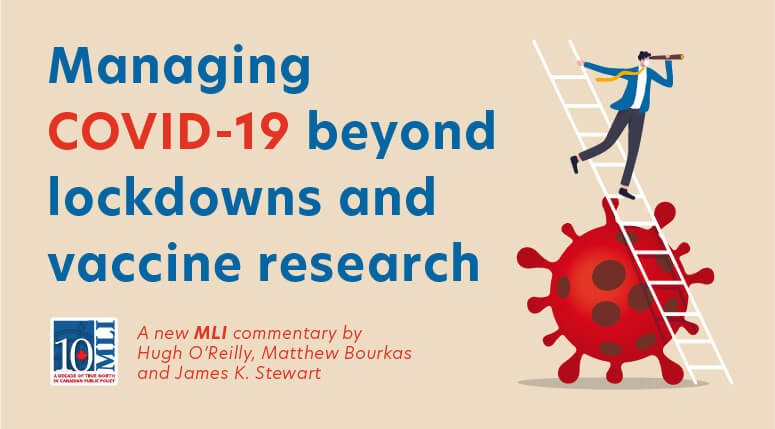OTTAWA, ON (November 18, 2020): Recent news from Pfizer-BioNTech and Moderna about their promising late-stage vaccine test results has been widely welcomed. Yet the Canadian government’s narrow focus on vaccines as the dominant near-term solution to COVID-19 has led to serious weaknesses in our capacity to deal with the current resurgence in the virus, forcing us to rely excessively on lockdowns and other forms of restrictions.
In the latest MLI commentary titled, “Managing COVID-19 beyond lockdowns and vaccine research,” authors Hugh O’Reilly, Matthew Bourkas, and James Stewart argue that the Canadian government needs to shift away from this ‘acute crisis’ approach to a strategy that sees COVID-19 as a chronic condition, one that will extend well into 2021.
It did not have to be this way. The lockdowns in early 2020, alongside the reduced incidence of COVID-19 that we enjoyed from late spring through summer, gave us significant time to better prepare for today’s COVID resurgence. Unfortunately, Canadian governments did not use this period to sufficiently bolster their testing, tracing and treatments (3Ts) or to improve their communication methods.
“We cannot approach the pandemic as an acute crisis that relies excessively on emergency lockdown measures while not addressing the serious weaknesses in communications, testing, tracing and treatment,” write O’Reilly, Bourkas, and Stewart.
The authors recommend that the federal government improve our national testing capacity to allow for more and faster testing to take place as Canada falls well below other countries when it comes to necessary levels of testing. Rapid antigen testing should be adopted as a complement to current PCR testing, similar to the method used by countries like Germany, Slovakia and the UK.
Though the Canadian government has provided an easily-accessible tool to track transmission in the form of the COVID Alert app, the authors write that “government statistics suggest a serious challenge in the application’s effective mobilization to date.” Given this inadequate contact tracing, all three levels of government need to focus on the problems of funding, training and logistics plaguing local tracing efforts.
Both the treatment and understanding of COVID-19 have improved rapidly and significantly since the onset of the pandemic. Yet significant gaps persist in how we treat COVID-19 cases. Concerns include the availability and distribution of these drugs, conflicting interim medical trial results, and insufficient investment in and use of other treatments (e.g., corticosteroids and proning).
Government messages have also been inconsistent and confusing. It is imperative to provide clearer, more consistent and simpler messages, with an emphasis on avoiding the 3Cs (closed spaces, crowded places and close-contact settings). As the authors explain, “improved communication starts with better information architecture and choice architecture for people to understand why and how they need to adhere to COVID-19 protocols on a sustained basis.”
Other policy recommendations include:
- Investing in infrastructure and technology that would allow hospitals, schools, and other workplaces to better adapt to COVID;
- Adding additional transit resources for low income and marginalized communities to enable more social distancing; and
- Introducing new innovations to make the hospitality and travel industry safer during COVID.
“A focus on better messaging of the 3Cs and investing in the 3Ts is likely to lead to behavioural changes that can better help to control, slow down and, potentially, eliminate community spread,” explain O’Reilly, Bourkas, and Stewart.
To learn more, read the full commentary here.
***
Hugh O’Reilly is the President and CEO of Acuity Global, a boutique consulting firm that provides advice on strategy to insurance companies, investment managers, real estate developers and start-ups.
Matthew Bourkas is a doctoral candidate with the University of Toronto’s Biochemistry Department. Matthew’s research focus includes prion diseases, the class of infectious diseases best known for causing the UK’s “Mad Cow,” epidemic.
James Stewart is an economist, the President of Pol-Econ Research Canada, and the president of a philanthropic foundation.
For more information, media are invited to contact:
Ai-Men Lau
Communications Officer
613-482-8327 x111
ai-men.lau@macdonaldlaurier.ca





